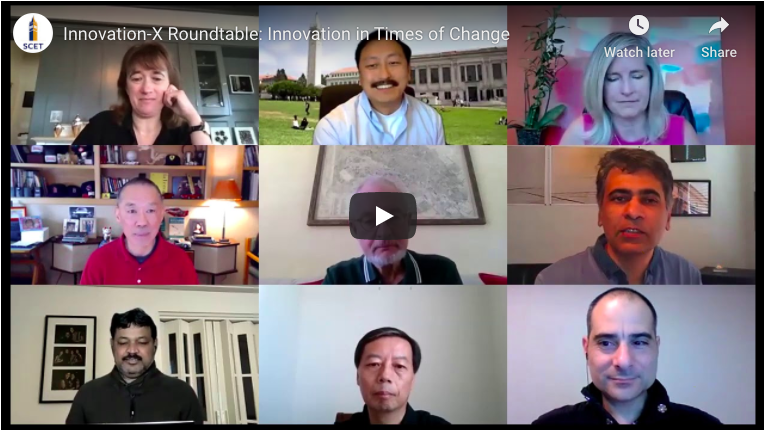
Black swans are rare and unpredictable events that create a huge impact on the ways we live and work. During the Covid-19 pandemic, individuals and companies have to adapt to a new normal for daily life. Which industries are thriving and which are struggling in the new normal? What will the consequences be for how we work in the future? How can companies adapt their innovation practices to thrive in the current climate?
Last week, the Sutardja Center for Entrepreneurship and Technology organized a roundtable discussion regarding ‘Innovation in Times of Change’. The conversation was moderated by SCET Co-Founder and current Executive Vice Chairman at Ygrene Energy Fund, Stacey Lawson. Alongside Stacey, SCET Faculty Director, Ikhlaq Sidhu, and SCET Managing Director, Ken Singer, with five distinguished panelists – Roy Kong, Etienne Deffarges, Thas Nirmalathas, Ed Soo Hoo, and Mike Kyriacou – engaged in discussions surrounding the temporary and long-lasting changes that are occurring right now due to the Covid-19 pandemic.

The roundtable started with a discussion on why innovation is essential today. The focus of the hour-long fire chat was how can innovation help organizations adapt to make the biggest impact on society now.
A few key takeaways from the extremely interesting conversation that ensued:
- The world has seen a lot of change over the past 6 months. Innovation before the pandemic versus innovation after the pandemic is completely different. Faculty Director Ikhlaq Sidhu described innovations before the pandemic as “far off vitamins” – innovation was about developing features that were not ultimately necessary for life or essential for survival. Since the shelter-in-place first started, innovation has become almost vital and indispensable; everyone has had to adapt and shift their lifestyle. The need for innovation now is much more real and genuine, and much less theater. Globally, businesses are witnessing a tectonic shift in people’s consumption habits – a shift to consuming only essentials. Innovation is “less about the gloss” now than it was 6 months before the pandemic.
- Systems are collapsing. The pandemic exposed a lot of the underlying problems in our current businesses – from broken supply chains to overreliance on trade. These systems are going to be reaching a new equilibrium and a new set of priorities that human beings won’t have complete control over. SCET Managing Director Ken Singer addressed the need for collaboration across industries, “We need to identify and share ways for companies to not just survive disruption but rather grow from it”. Innovation is the way we prepare the next generations for endless disruption, where companies will not have to come to a standstill even if the situation is beyond their control.
- Ed Soohoo, an Innovation & Transformation Executive at Lenovo, had a fascinating perspective regarding business ideology in the face of a black swan event: “What companies need to do is change their mindset from ‘recovery’ to ‘renaissance’”. Renaissance essentially means rebirth. Instead of focusing on how the firm should recover and get back to doing the same thing they were doing before, it is now time to address the renaissance (the rebirth) of your consumer, your workforce, your supply chain, your business model. What companies need to do is switch from ‘tactical mode’ to ‘strategic mode’, or in other words, to transition from ‘merely surviving’ to ‘strongly thriving’. This is where innovation comes in – leaders and individuals need to begin thinking along the lines of what is it going to take to reassess, rebuild, and redeploy the workforce, the products, and the services for the changing demand. From an innovation standpoint, it is not enough to just combine new technology, but companies also need to combine fresh, wise eyes to navigate innovation and change into these new conditions.
The roundtable conversation then proceeded towards detailed insights into specific industries such as healthcare, retail, food, travel, and hospitality services. To hear more about the concrete ways organizations can improve their innovation practices in the changing environment and how to find opportunities during crises, do watch the event recording and hear from our esteemed panelists below!
The Berkeley Innovation-X Initiative is focusing on ‘Innovation that Matters’ to help organizations adapt to make the biggest impact for industry and society now. Check out our website here!
